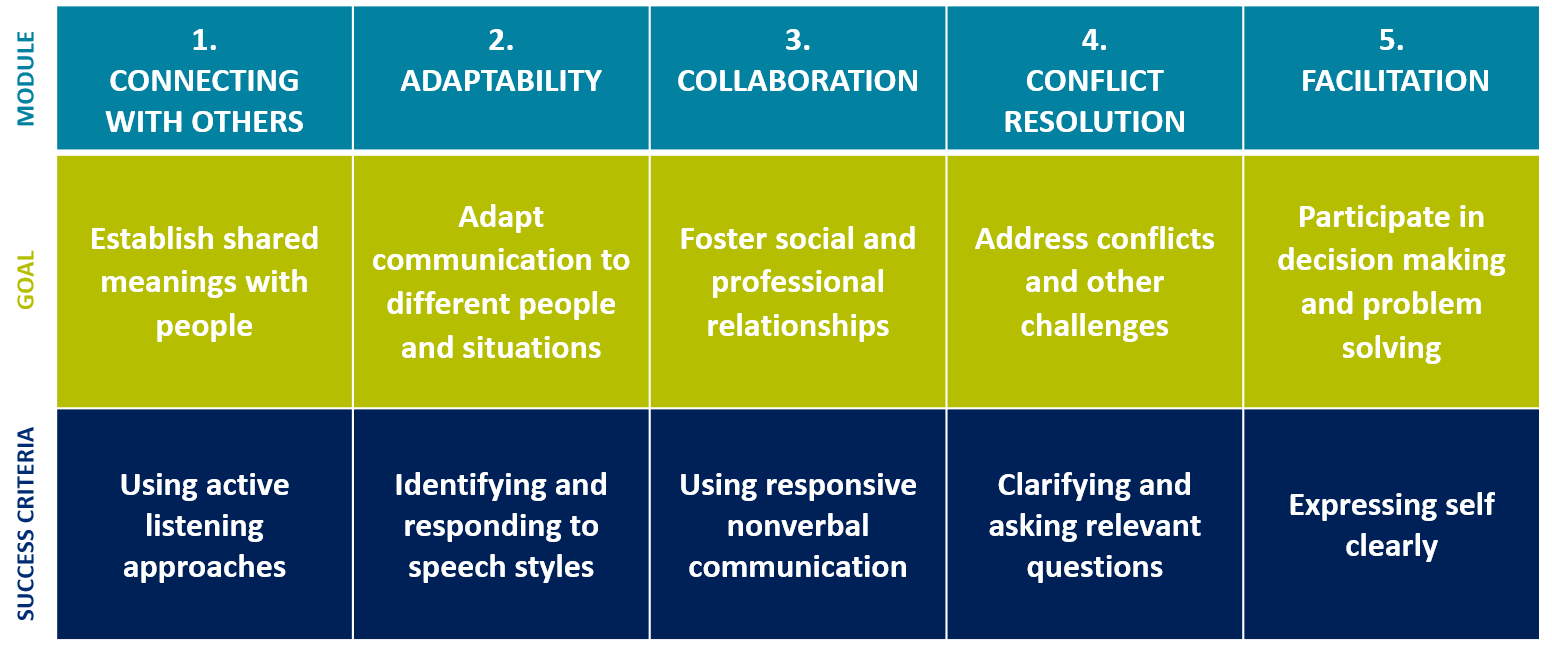About
Communication through Simulation is a formative intercultural communication program designed to increase awareness and stimulate strategies for general workplace communication competence in Ontario’s health force. The program is unique in its application of simulation as a modality for learning, as it is entirely non-clinical in nature. Communication through Simulation is rooted in transferrable communication competencies that are essential to healthcare practice in Ontario.
It is delivered in a five-module structure by instructors with culture and communication expertise. The program has been evaluated, piloted virtually, and proven to be effective at improving confidence and competence in healthcare specific communication skills.
Program Dates
At this time there are no scheduled program dates. Please return to this website for updates or contact us to learn more about the program.
Key Facts
Key Facts
Curriculum
An Empathy-Driven Curriculum
Communication through Simulation was designed to specifically address the unique challenges and needs of healthcare professionals who are navigating fast-paced practice settings and diverse patient populations. The curriculum adopts an empathy-driven curriculum to not only demystify what patient-centred care looks and sounds like, but also to empower the person within the profession. The curriculum reinforces the practice and application of key professional skills, such as active listening, advocacy, boundary setting, and conflict resolution.
By engaging in this intensive curriculum, learners will experience:
- The invisible cultural expectations embedded in professional communication standards
- The relationship between intercultural competence and self-awareness
- The impact of personal biases on professional relationships
- The connection between patient-centred care and person-centred communication
- The relationship between assumptions and miscommunication, conflicts, and decision-making errors
Modules
5 Day Online Intensive Program

The Communication through Simulation program has identified five key module topics, goals, and success criteria that correlate to the unique communication challenges in Canada’s multicultural healthcare context. Over the span of the five modules, learners will explore and practice communication strategies, and identify practical ways to apply them to authentic healthcare communication challenges.
Program Details
Communication through Simulation is unique in its application of the simulation-based methodology, as it is entirely non-clinical in nature.
Simulation is a learning methodology that is commonly leveraged in the clinical training of health professionals for its success in presenting immersive, experiential, and high-fidelity learning challenges. Simulation uses trained individuals to simulate real-life encounters that create opportunities for learners to practice applying new knowledge, strategies, and skills in a formative and constructive environment.
The Communication through Simulation program has developed a series of authentic workplace interactions that provide learners with dynamic, real-time opportunities to assess their communication skills and learn from feedback provided by facilitators and simulated clients.
Feedback is at the core of the simulation-based learning methodology. Providing effective and appropriate feedback requires knowledge and awareness around the ways in which delivering and receiving feedback can:
- lead to or resolve conflict
- strengthen or weaken relationships
- facilitate or deter confident decision making.
Through participation in Communication through Simulation, learners are guided through a robust feedback framework to practice and apply the feedback skills necessary to improve professionalism in healthcare settings.
Reflective practice has been woven throughout the Communication through Simulation curriculum to foster skills related to self-awareness and critical thinking, as well as increase motivation for ongoing learning. The reflective practice methodology encourages learners to self-identify their own areas of strengths, weaknesses, and key learnings in order to improve their future practice.
Many clinical training programs, as well as regulatory bodies, have identified reflective practice as a key competency for professional development and continuing education. For this reason, each module closes with a guided Reflective Practice assignment.
Communication through Simulation is an virtual program that combines both synchronous and asynchronous learning components. Learners will engage in real-time simulations and dynamic group learning led by professional instructors, as well as engage in self-directed, independent study.
Daily morning sessions are led by an intercultural communication specialist who explores cultural themes, communication strategies, and challenging situations in Canada’s multicultural healthcare workforce.
Daily afternoon sessions consist of simulated encounters and feedback sessions that enable learners to practice and apply strategies taught during the morning sessions.
Communication through Simulation is offered through Touchstone Institute to internationally educated health professionals seeking communication and intercultural supports for their practice in Canada.
The program is intended for learners with a proficiency level that ranges from intermediate advanced language skills to speakers of English as their first language (Canadian Language Benchmark [CLB] level 8 or higher). This is not an English language training program. Learners with a proficiency level lower than CLB 8 may have difficulty engaging in the program due to the nuanced nature of the simulations.
Following the completion of all modules, learners can request a letter of completion from Touchstone Institute.
To participate in virtual programming, learners are required to have:
- A stable and secure internet connection
- Attend on a device that supports a camera and microphone (computer or tablet recommended; phones will not be supported for live sessions)
- Zoom installed and up to date on your supported device
To optimize the experience of the program, learners are recommended to have:
- A private and quiet space to attend programming
- A separate headset (wired or wireless)